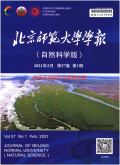北京师范大学学报(自然科学版)2024,Vol.60Issue(3):325-330,6.DOI:10.12202/j.0476-0301.2023258
基于卷积神经网络的高效量子态层析方法
Efficient quantum state tomography method based on convolutional neural networks
摘要
Abstract
Various reconstruction algorithms of quantum state tomography are sorted out systematically.Combining with MATLAB numerical simulation,the reconstruction effects of linear reconstruction,linear regression estimation,maximum likelihood estimation and deep neural network-based quantum state tomography are compared and analyzed.For 1 to 3 qubits,convolutional neural network(CNN)based reconstruction algorithms achieves a fidelity of>99.5%with a shorter period of time,which has significant advantages in algorithm complexity and fidelity compared to other classical reconstruction algorithms.Due to the strong fitting ability to complex models,CNN helps to solve the problem of negative eigenvalues in estimated density matrices,making all the estimated density matrices reconstructed with it physically meaningful.关键词
量子态层析/密度矩阵/卷积神经网络/保真度/负本征值Key words
quantum state tomography/density matrix/convolutional neural network/fidelity/negative eigenvalue分类
数理科学引用本文复制引用
孙乾,蒋楠..基于卷积神经网络的高效量子态层析方法[J].北京师范大学学报(自然科学版),2024,60(3):325-330,6.基金项目
国家自然科学基金资助项目(12204055) (12204055)

